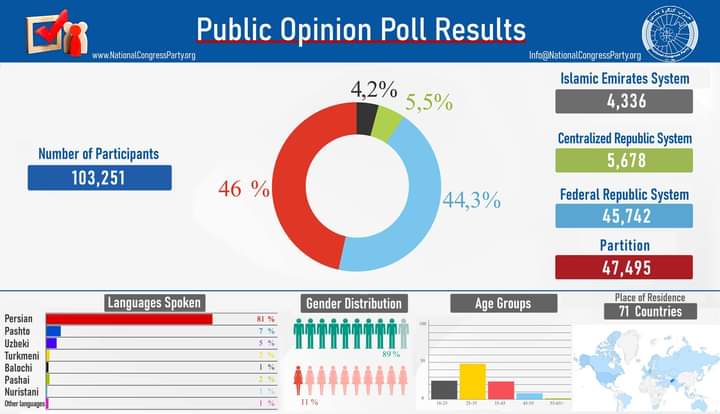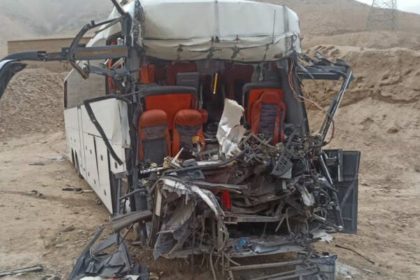RASC News Agency: Tribal and linguistic superiority among the rulers of Afghanistan from the past until now has led to a prolonged national conflict in the country. The imposition of (Afghan) identity on other ethnic groups, exclusionary policies, unfair distribution of political power and national wealth, starting from the rise of Ahmad Shah Durrani to the present, have resulted in the loss of national unity among the people of the country. As a result, the majority of non-Pashton ethnic groups seek the partition of Afghanistan to break free from external political dependencies, ethnic dominance, and the absolutism of tribal rulers.
An online survey conducted by the National Congress Party of Afghanistan regarding the nature of the country’s political system and public support for its implementation reveals that 46% of the Afghanistan population is in favor of the country’s partition.
According to the results announced by the National Congress Party of Afghanistan, after the partition, the majority of the Afghanistan people support a change in the political system and endorse a federal republic.
The results of this survey, published on Sunday, November 12th, indicate that 46% of the country’s population supports the partition of Afghanistan, which is higher than the supporters of the federal system in Afghanistan.
In the statement released by the National Congress Party of Afghanistan, it is stated that 44% of the Afghanistan people have supported federalism in the country in this survey.
Led by Abdulatif Pedram, the National Congress Party is the only political party in Afghanistan that, after the fall of the Republican regime and the establishment of the republic, has advocated for federalism in Afghanistan as the only solution to the country’s political conflicts and power concentration.
Mr. Pedram, considering the challenges of tribal power monopolies by past Afghanistan rulers over the past twenty years, has repeatedly emphasized that the concentration of political power is the fundamental problem for the people of Afghanistan, and that establishing a federal republic could alleviate this issue. Previously, the National Congress Party announced in October 23rd, that it had launched an online survey called “The Right to Determine Destiny” on the future political system of Afghanistan, asking the Afghanistan people to choose one of the options: “Islamic Emirate,” “Republic Presidency,” “Federal Republic,” or “Partition.”
According to statistics compiled by the party, more than 103,000 people participated in this survey, including Persian speakers, Pashtons, and other ethnic groups of Afghanistan.
According to the published information by the party, 11% of the participants in this survey were women, while 89% were men. The majority of respondents were in the age range of 25 to 35 years. Among the four options of Islamic Emirate system, Presidential Republic system, Federal Republic system, and Disintegration, the lowest percentage was related to the “Islamic Emirate,” with only 4% of supporters in this survey. Mr. Pedram, who is considered one of the prominent politicians in Afghanistan, has previously mentioned the idea of creating a federal system for the political structure of Afghanistan. He believes that the only solution to the existing political crises is the division of power and the distribution of economic resources in Afghanistan by changing the Presidential Republic system into a Federal Republic.
According to Mr. Pedram, the Presidential system centralizes all the powers to the President, which turns the President into an absolute dictator who can make decisions beyond the law. He further explains that the Federal Republic system does not imply the disintegration of the country in any way. Instead, it grants more powers to the states and federal entities. Federalism means unity, agreement, and a contract in which a group of units (states, provinces, countries, etc.) commit to each other and have a central government representing them.
Meanwhile, political analysts argue that the main realities of Afghanistan society are reflected in this survey. According to them, the tribalistic tendencies of the rulers and their numerous historical crimes against other ethnic groups in Afghanistan, who have forcibly oppressed the people, have created significant gaps among the people of the country. Now, the Taliban group is further exacerbating and intensifying these social, ethnic, and linguistic divisions.
According to these experts, the reality of Afghanistan society is that Pashtons consider themselves a superior ethnic group and have historically tried to impose their culture, identity, and language on other ethnic groups in the country, which still persists today. In the opinion of these political experts, a federal system can be a significant obstacle to the country’s disintegration. Without the formation of such a political system and considering the social gaps and ethnic conflicts for power and wealth, the distances between people will likely continue to grow, leading Afghanistan to years of separatist movements.






